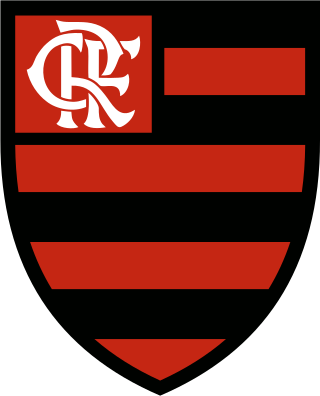
Clube de Regatas do Flamengo, more commonly referred to as simply Flamengo, is a Brazilian sports club based in Rio de Janeiro, in the neighborhood of Gávea, best known for their professional football team that plays in Campeonato Brasileiro Série A, as well as Campeonato Carioca. They are one of two clubs to have never been relegated from the top division, the other being São Paulo.

Beach soccer, also known as beach football, sand football or beasal, is a variant of association football played on a beach or some form of sand.
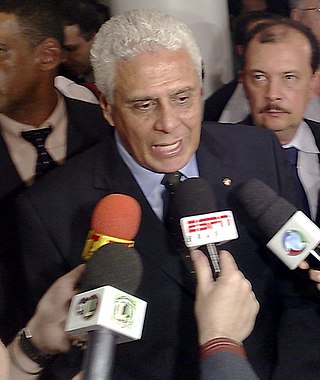
Carlos Roberto de Oliveira, known as Roberto Dinamite, was a Brazilian footballer and politician. He was born in Duque de Caxias, Rio de Janeiro state. With a career as centre forward spanning over twenty years, Roberto is Vasco da Gama's player with the most appearances and all-time top goalscorer, as well as the overall leading scorer in the Brazilian Série A and the Rio de Janeiro State Championship. At the national level, Roberto Dinamite played in the 1978 and 1982 FIFA World Cups and the 1972 Olympic Games. He was president of Vasco da Gama from 2008 to 2014.

The 2000 FIFA Club World Championship was the inaugural FIFA Club World Cup, the world club championship for men's club association football teams. It took place in Brazil from 5 to 14 January 2000. FIFA as football's international governing body selected Brazil as the host nation on 8 June 1999 as the bid was found to be the strongest among four candidates. The draw was made at the Copacabana Palace in Rio de Janeiro on 14 October 1999. All matches were played in either Rio de Janeiro's Estádio do Maracanã or São Paulo's Estádio do Morumbi.
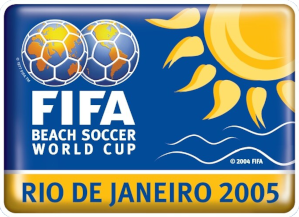
The 2005 FIFA Beach Soccer World Cup was the first edition of the FIFA Beach Soccer World Cup, an international beach soccer competition contest by men's national teams and organized by FIFA. Overall, it was the 11th edition of a world cup in beach soccer since its establishment with the first Beach Soccer World Championships in 1995. It took place in at Copacabana Beach in Rio de Janeiro, Brazil, between 8 and 15 May.
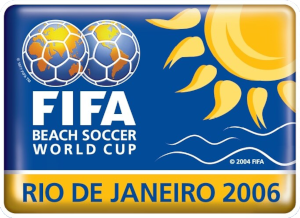
The 2006 FIFA Beach Soccer World Cup was the second edition of the FIFA Beach Soccer World Cup, governed by FIFA. Overall, this was the 12th edition of a world cup in beach soccer since the establishment of the Beach Soccer World Championships which ran from 1995–2004 but was not governed by FIFA. It took place in Rio de Janeiro, Brazil, from 2–12 November 2006.
The 2001 Beach Soccer World Championships was the seventh edition of the Beach Soccer World Championships, the most prestigious competition in international beach soccer contested by men's national teams until 2005, when the competition was then replaced by the second iteration of a world cup in beach soccer, the better known FIFA Beach Soccer World Cup. It was organised by Brazilian sports agency Koch Tavares.
The 1996 Beach Soccer World Championships was the second edition of the Beach Soccer World Championships, the most prestigious competition in international beach soccer contested by men's national teams until 2005, when the competition was then replaced by the second iteration of a world cup in beach soccer, the better known FIFA Beach Soccer World Cup. It was organised by Brazilian sports agency Koch Tavares.
The 1997 Beach Soccer World Championships was the third edition of the Beach Soccer World Championships, the most prestigious competition in international beach soccer contested by men's national teams until 2005, when the competition was then replaced by the second iteration of a world cup in beach soccer, the better known FIFA Beach Soccer World Cup. It was organised by Brazilian sports agency Koch Tavares.
The 1998 Beach Soccer World Championships was the fourth edition of the Beach Soccer World Championships, the most prestigious competition in international beach soccer contested by men's national teams until 2005, when the competition was then replaced by the second iteration of a world cup in beach soccer, the better known FIFA Beach Soccer World Cup. It was organised by Brazilian sports agency Koch Tavares.
The 1999 Beach Soccer World Championships was the fifth edition of the Beach Soccer World Championships, the most prestigious competition in international beach soccer contested by men's national teams until 2005, when the competition was then replaced by the second iteration of a world cup in beach soccer, the better known FIFA Beach Soccer World Cup. It was organised by Brazilian sports agency Koch Tavares.
The 2000 Beach Soccer World Championships was the sixth edition of the Beach Soccer World Championships, the most prestigious competition in international beach soccer contested by men's national teams until 2005, when the competition was then replaced by the second iteration of a world cup in beach soccer, the better known FIFA Beach Soccer World Cup. It was organised by Brazilian sports agency Koch Tavares.

The 2002 Beach Soccer World Championships was the eighth edition of the Beach Soccer World Championships, the most prestigious competition in international beach soccer contested by men's national teams until 2005, when the competition was then replaced by the second iteration of a world cup in beach soccer, the better known FIFA Beach Soccer World Cup. It was organised by Brazilian sports agency Koch Tavares.

The 2003 Beach Soccer World Championships was the ninth edition of the Beach Soccer World Championships, the most prestigious competition in international beach soccer contested by men's national teams until 2005, when the competition was then replaced by the second iteration of a world cup in beach soccer, the better known FIFA Beach Soccer World Cup. It was organized by Brazilian sports agency Koch Tavares in cooperation with and under the supervision of Beach Soccer Worldwide (BSWW), the sports governing body.
The 2004 Beach Soccer World Championships was the tenth and final edition of the Beach Soccer World Championships, the most prestigious competition in international beach soccer contested by men's national teams; the following year, the competition was replaced by the second iteration of a world cup in beach soccer, the better known FIFA Beach Soccer World Cup. It was organized by Brazilian sports agency Koch Tavares in cooperation with and under the supervision of Beach Soccer Worldwide (BSWW), the sports governing body.
The BSWW Mundialito, often simply known as Mundialito, is an annual international beach soccer tournament that takes place between few select countries, which are invited to play at the tournament organized by Beach Soccer Worldwide (BSWW). First played in 1994 at Copacabana beach, Rio de Janeiro, Brazil, the competition was reignited in 1997 in Portugal, where it was held ever since until 2022. Few nations have won the tournament, those being only Brazil, Portugal, United States and Spain.
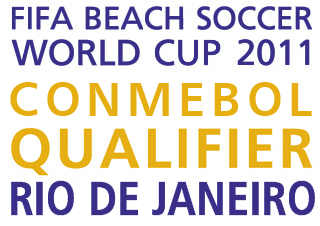
The 2011 FIFA Beach Soccer World Cup CONMEBOL qualifier, also later and commonly known as the 2011 South American Beach Soccer Championship, was the fourth Beach Soccer World Cup qualification championship for South America, held from July 31– August 7 on Copacabana beach in Rio de Janeiro, Brazil. The tournament was originally scheduled to take place from 7 – 14 May 2011.
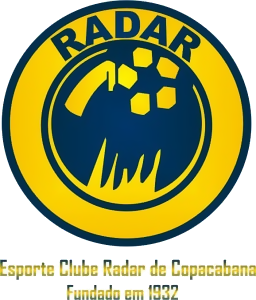
Esporte Clube Radar was a Brazilian professional women's association football club, based in the Copacabana neighbourhood of Rio de Janeiro, Brazil. Founded as a beach football side in 1981 and restructured for association football in 1982, Radar enjoyed unprecedented success in the early days of women's football in Brazil, winning both the Taça Brasil de Futebol Feminino and the Campeonato Carioca de Futebol Feminino on six consecutive occasions during the 1980s and at one point claiming a record of only four losses in more than 300 matches played. Additionally, they would barnstorm in high-profile televised challenge matches against other Brazilian women's teams.
The third Mundialito de Clubes is a beach soccer tournament that took place, for the first time, at a temporary stadium at Copacabana Beach in Rio de Janeiro, Brazil from 10 – 17 November 2013. The previous two editions were held at the Praia do Sol stadium at the Arena Guarapiranga sport complex, located near Represa de Guarapiranga, a reservoir located in São Paulo, Brazil.

Carlos Alberto Lisboa, better known as Neném, is a retired Brazilian beach soccer player who played as a forward. He was a mainstay of the Brazil national team from 1994 until 2005. Injury forced him into retirement in 2009.











